Bridget Phillipson & Julia Gillard: an IWD conversation
Join the Global Institute for Women's Leadership – now part of King's Business School – and Ipsos UK for an International...
05 March 2025
The gender divide in views is greater than for any other generation surveyed

Men and women belonging to Gen Z are more divided than those of any other generation on key questions about feminism, gender roles and women’s rights, according to a new 30-country study to mark International Women’s Day.
The research, carried out by Ipsos UK and the Global Institute for Women’s Leadership at King’s College London – based at King’s Business School – finds that while younger generations are often thought to be uniformly supportive of efforts to advance gender equality, in reality the views of Gen Z men and women often starkly diverge on these issues.
Of all generations surveyed, Gen Z opinion is most divided by gender on whether they define themselves as a feminist, whether a man who stays home to look after his children is less of a man, whether men are being expected to do too much to support equality, and whether we’ve gone so far in promoting women’s equality that we are discriminating against men.
The study, based on a survey of nearly 24,000 people across 30 nations, also finds that although people perceive less tension between men and women than between other groups in society – such as rich and poor people – Gen Z are more likely than older age generations to feel there is tension between genders in their country.
And there is a great deal of national variation on this question, with South Korea ranking worst for perceptions of tension between men and women, while Britain does much better, including compared with peers such as the US and Australia.
Most positively, majorities in every country surveyed say achieving gender equality is important to them personally – although when it comes to solutions for how to achieve this, the public are relatively divided on whether policies adopted by businesses and governments have been successful.
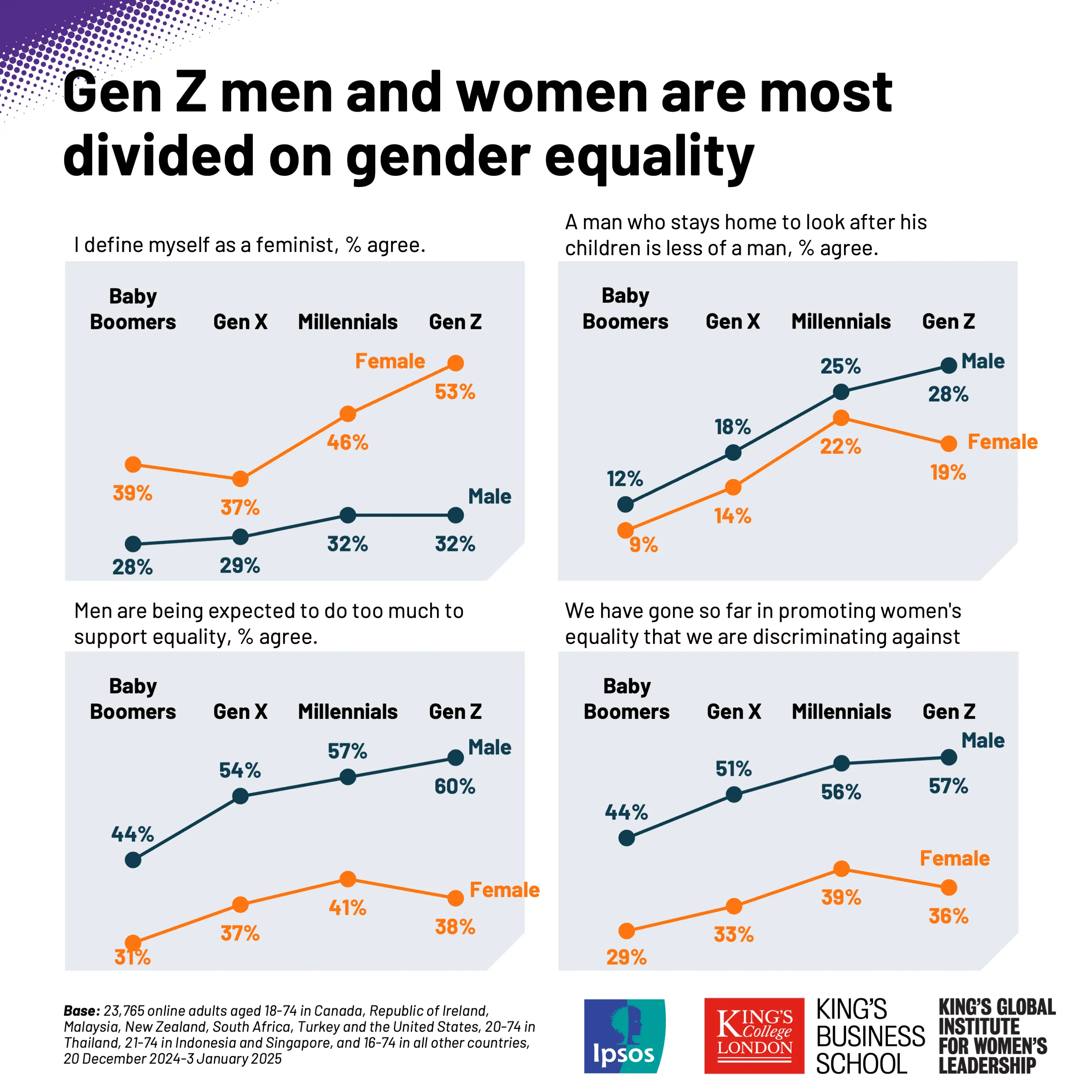
53% of Gen Z women saying they define themselves as a feminist, compared with 32% of Gen Z men – a gap of 21 percentage points.
This is the biggest gender split among generations surveyed: Millennials are next most divided, with a 16-point gap between men and women, while the gap between Baby Boomers and Gen X is 11 points and 8 points respectively.
And Gen Z men (32%) are only slightly more likely than men from older generations such as Baby Boomers (28%) and Gen X (29%) to see themselves as feminists.
By contrast, Gen Z women are considerably more likely to identify this way: over half (53%) see themselves as feminists – far higher than the share of Baby Boomers (39%), for example.
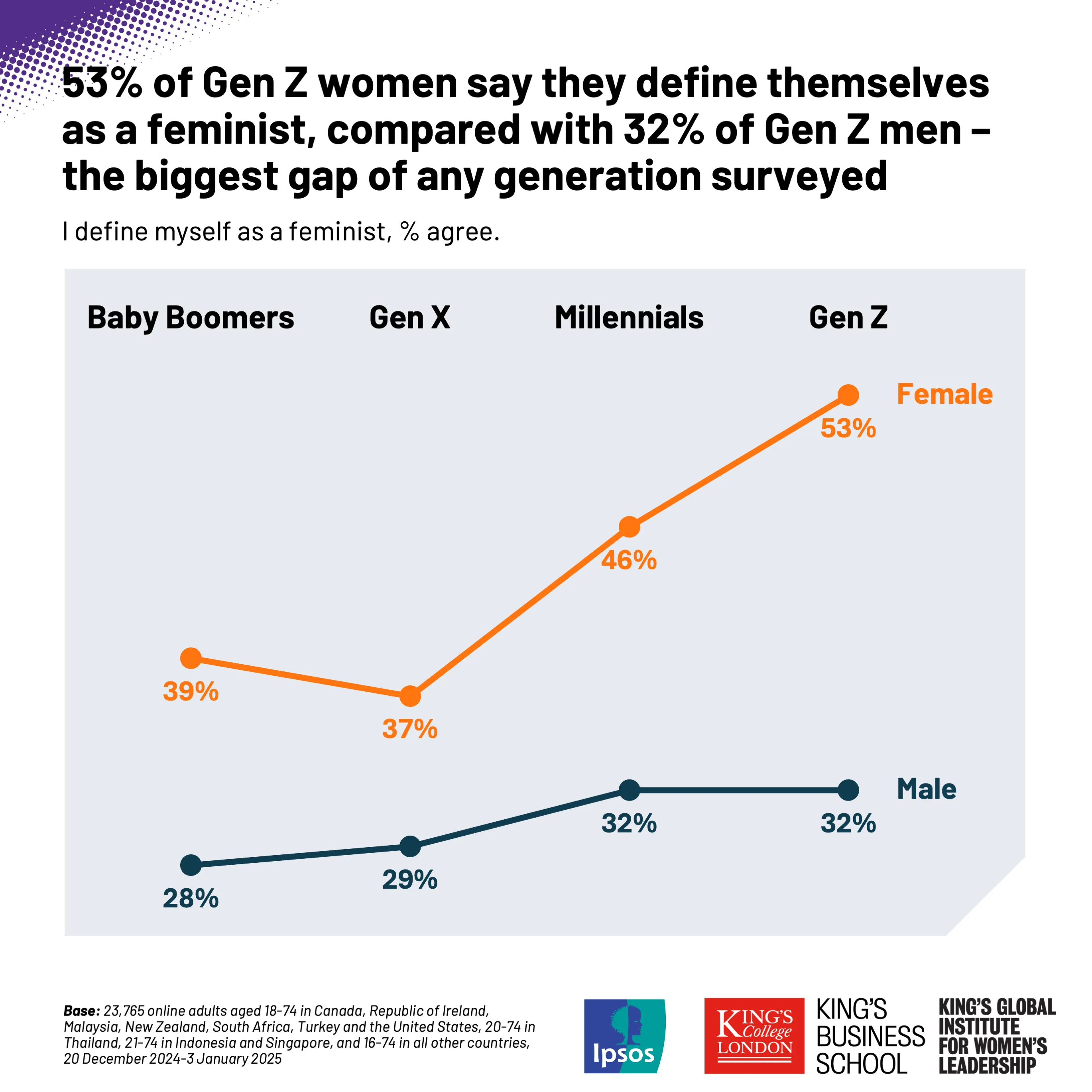
Over a quarter (28%) of Gen Z men say a man who stays home to look after his children is less of a man – nine points higher than the share of Gen Z women (19%) who say the same.
Among Millennials – who are next most likely to agree with this view – there is just a three-point gender gap in opinion between men (25%) and women (22%).
Baby Boomer men (12%) and women (9%) are around half as likely as their counterparts from these younger generations to hold this negative view of men who stay home to care for their children.
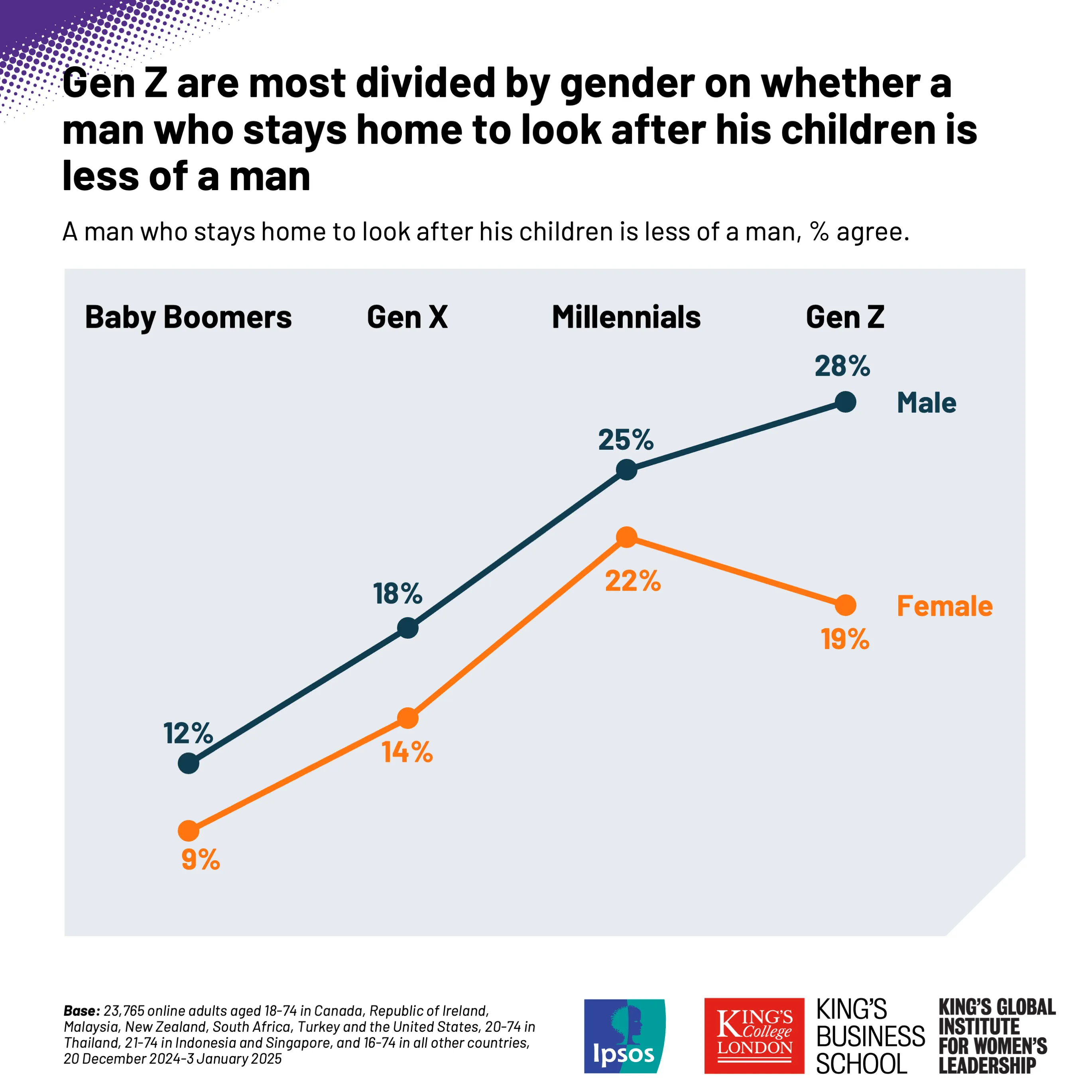
Six in 10 (60%) Gen Z men agree men are being expected to do too much to support equality, 22 points higher than the four in 10 (38%) Gen Z women who feel the same.
Again, this is the largest generational gender divide on this question, with the next biggest gap among Gen X, where there is a 17-point difference in opinion between men and women.
And it is the oldest generation surveyed – Baby Boomers – who are least likely to say men are being asked to do too much, with 44% of men and 31% of women in this group feeling this way.
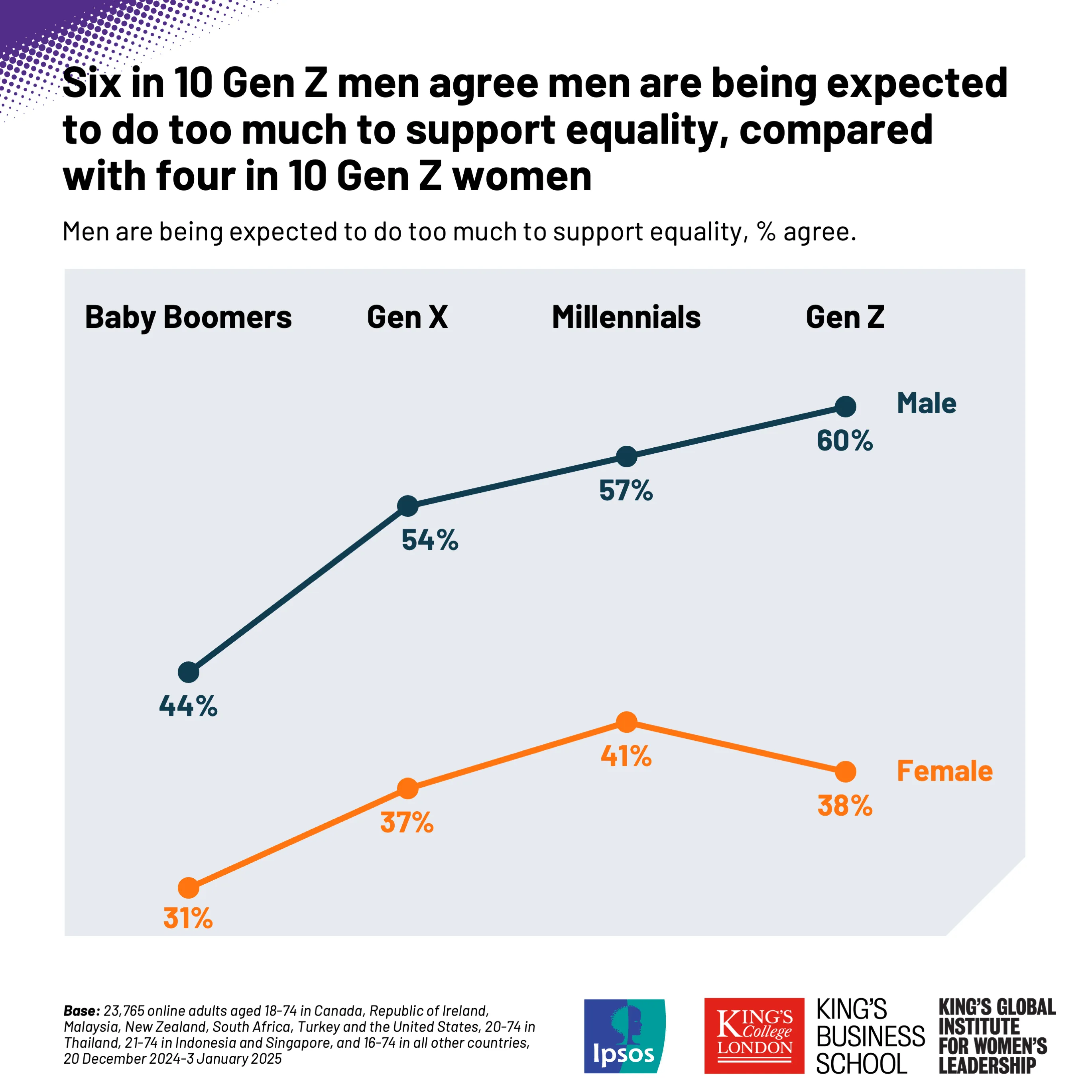
Around six in 10 (57%) Gen Z men also say we have gone so far in promoting women's equality that we are discriminating against men, compared with around a third (36%) of Gen Z women who hold this opinion.
This gap of 21 percentage points is larger than among any other generation surveyed, with the next biggest divide among Gen X, where the split in agreement is 18 points (51% for men vs 33% for women).
And once again, the oldest generation surveyed is in fact most progressive on this question: Baby Boomers are the only cohort where fewer than half (44%) of men think efforts to promote women’s equality have led to discrimination against men, while 29% of women in this group feel the same – the lowest of any generation.
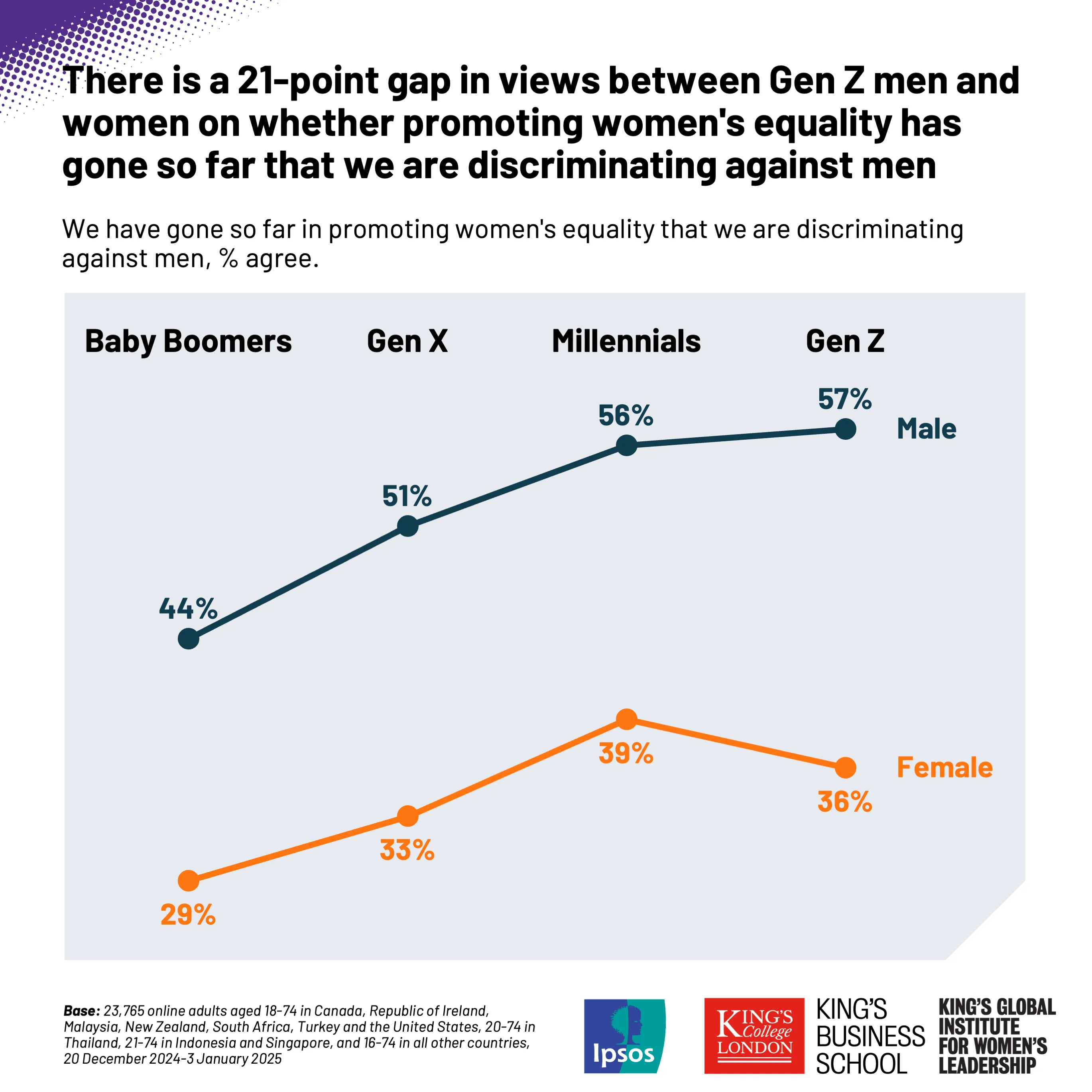
While tension between several other groups in society – such as between rich and poor – is felt equally across generations, there is a much clearer age divide in perceptions of tension between men and women in society.
Six in 10 (59%) members of Gen Z across the 30 countries surveyed say there is tension between men and women today – the most of any generation surveyed, followed by Millennials (54%). This compares with 40% of Baby Boomers, who are least likely to feel such tension exists.
And majorities of both Gen Z men (55%) and women (62%) agree this is this the case, with this gap in views the same or slightly smaller than that seen among older generations, indicating greater consensus between genders.
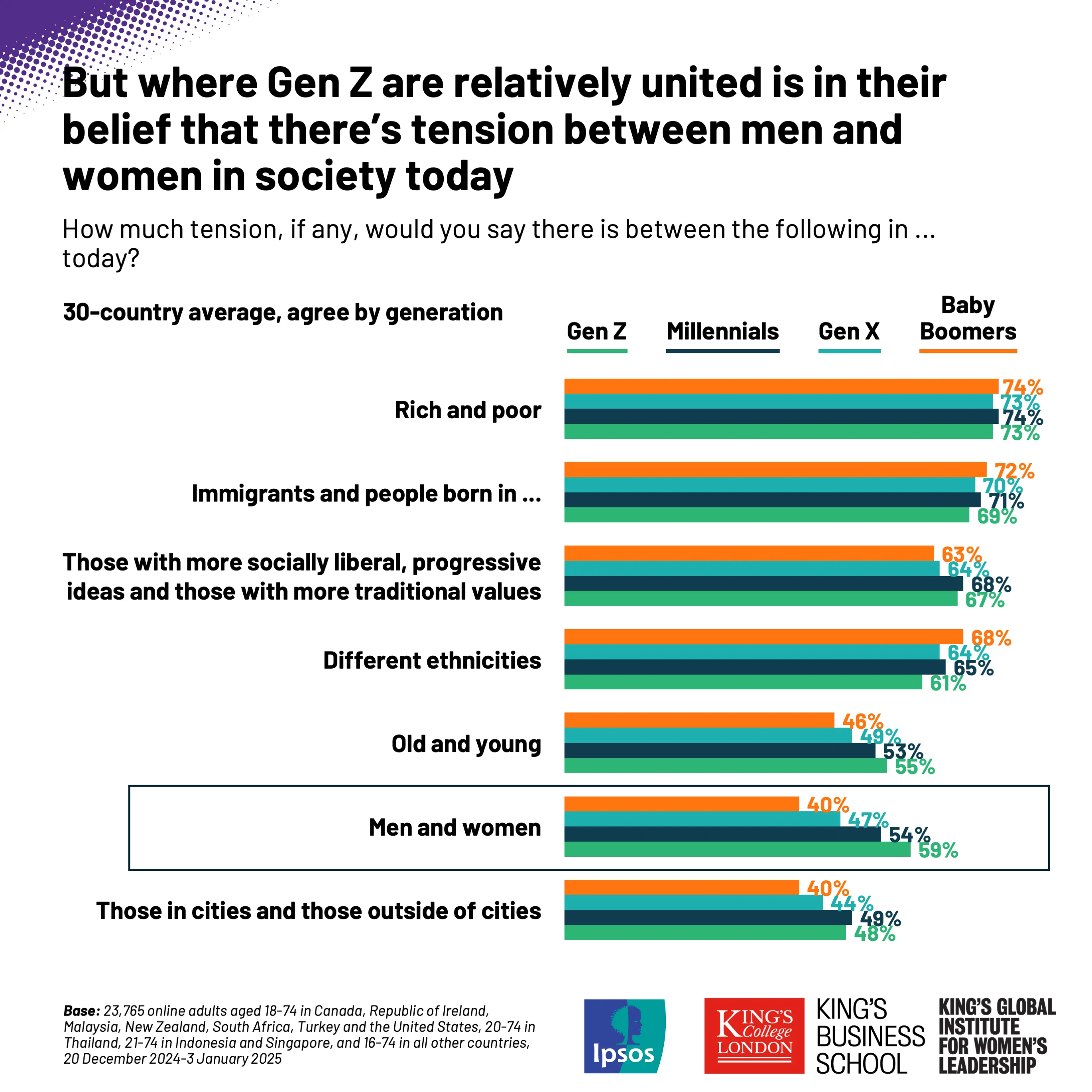
76% of people in South Korea say there is tension between men and women in the country – the highest of 30 countries surveyed on this question.
Great Britain (40%), by contrast, fares much better, ranking 26th out of the 30 nations for perceptions of tension between men and women – on a par with Germany (40%) and France (41%) – and far behind the likes of Australia (51%) and the US (58%), where more than half the population say tension exists between men and women.
However, overall across the 30 countries, a much lower proportion say there is tension between men and women (51%) in their country compared with between other groups. For example, around seven in 10 (73%) say there is tension between rich and poor or between immigrants and native-born people (70%), while a similar share say there is tension between those with more social liberal, progressive ideas and those with more traditional values (66%).
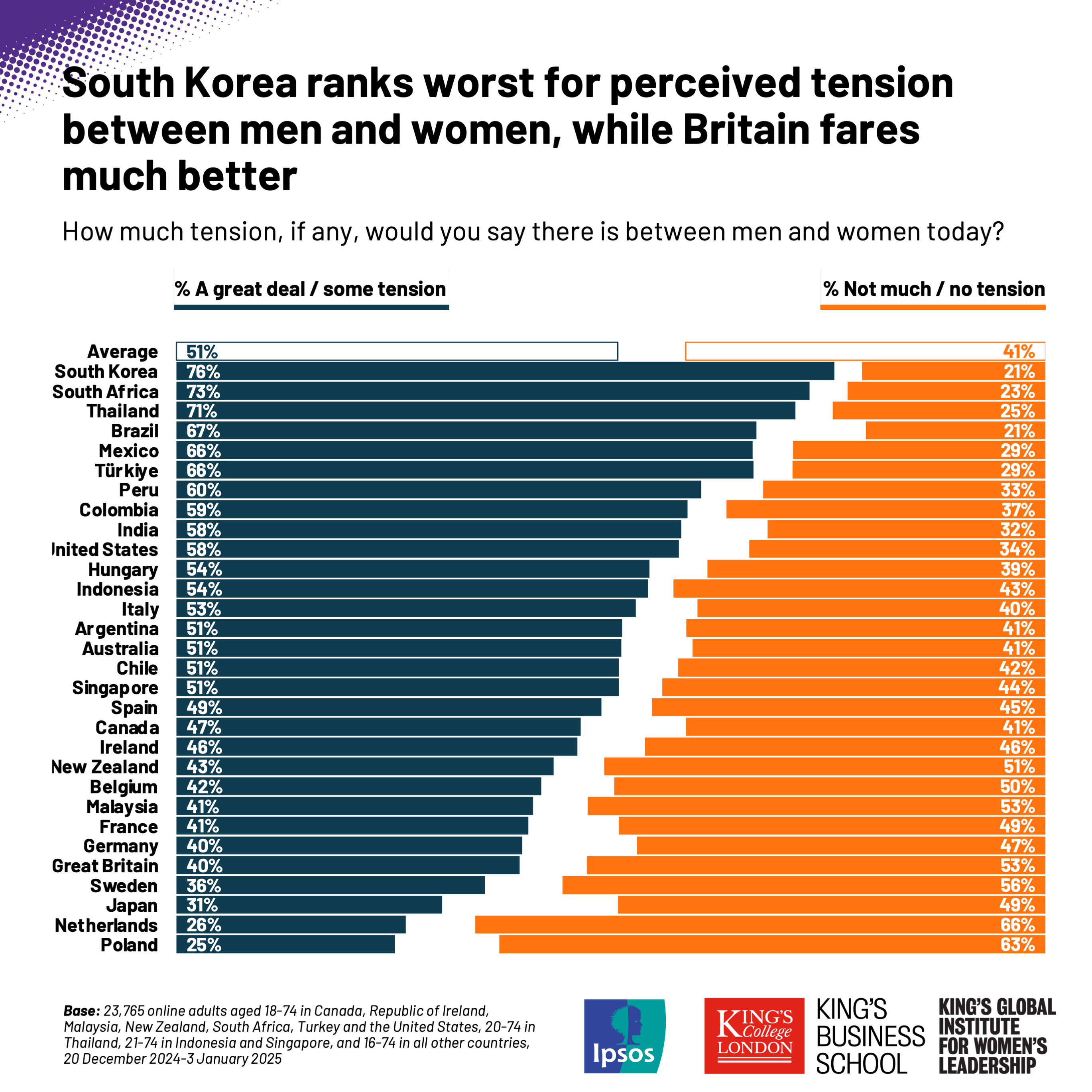
Despite some negative trends, overall, two in three people (68%) – including a majority of men (62%) – across the 30 countries surveyed say that achieving equality between men and women is important to them personally, with fewer than one in five (16%) saying it’s not important.
And in every country a majority of people say that gender equality is important to them – even South Korea, which ranks lowest on this measure, with 52%.
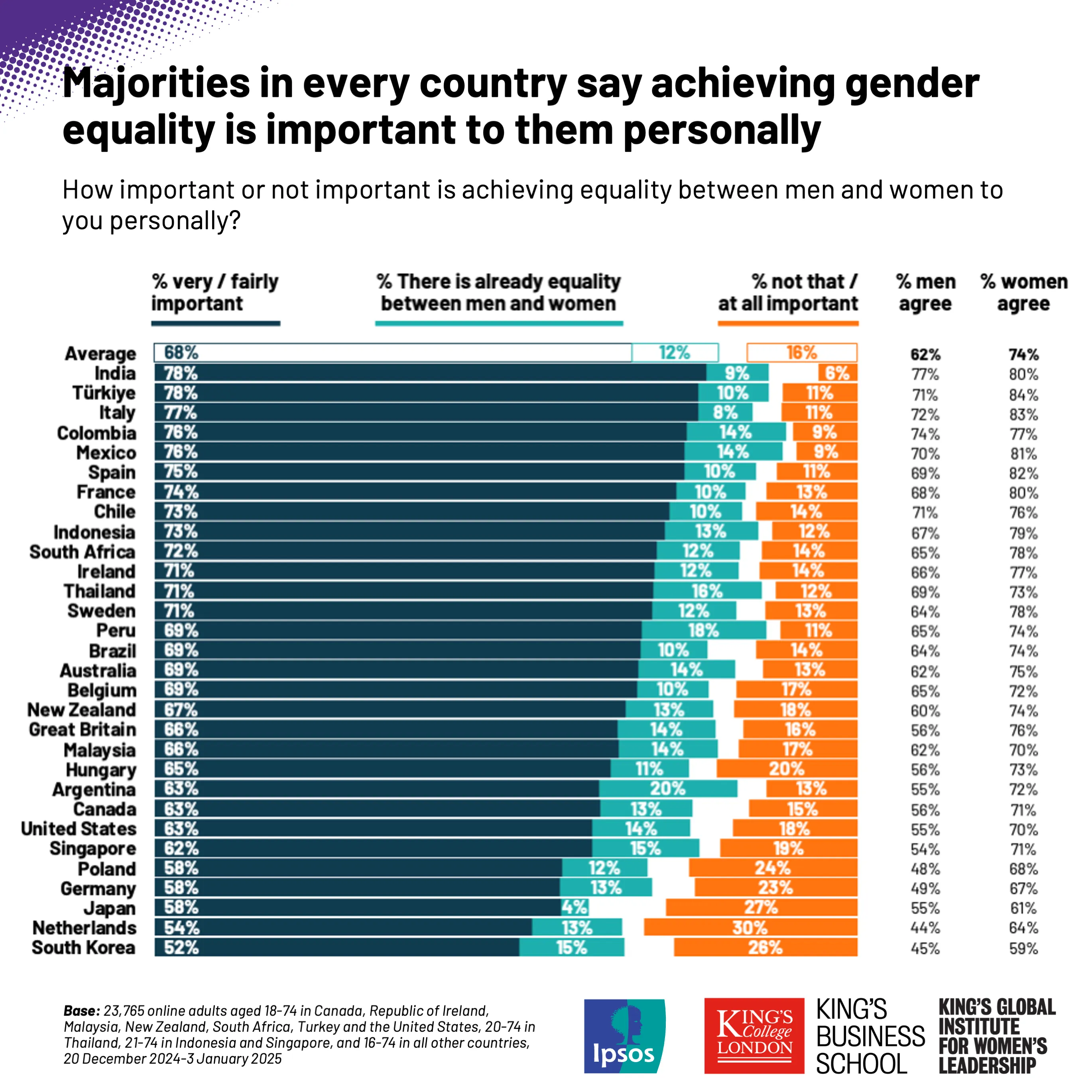
Across the 30 countries surveyed, an average of one in three (35%) people say the policies adopted by the businesses of their nation in the pursuit of gender equality over the past five years have had a positive impact on society – but roughly the same proportion (39%) say these policies have made no difference (28%) or had a negative impact (11%). A similar divide in opinion can be seen in view of the impact of policies adopted by governments across the 30 countries.
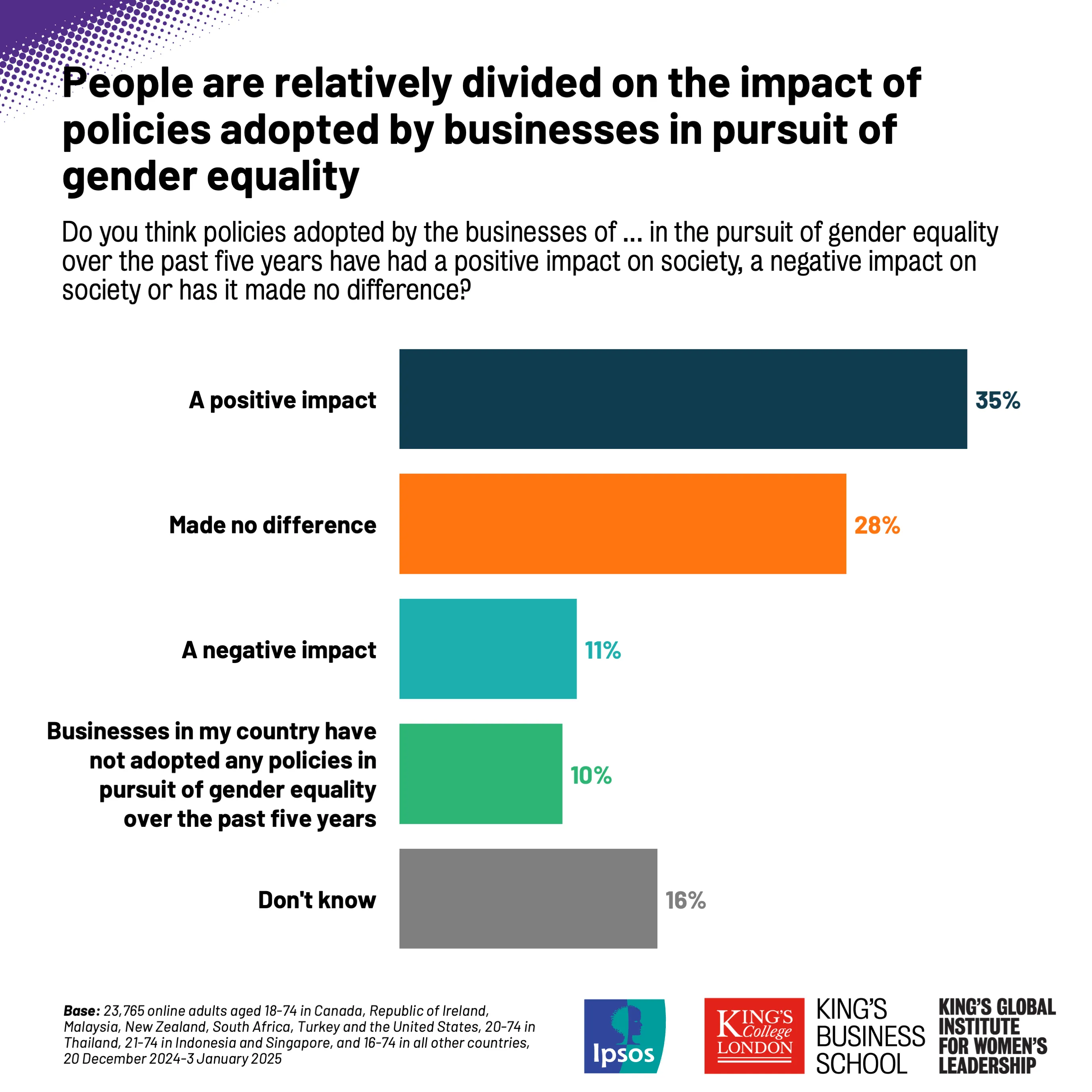
Professor Heejung Chung, Director of the Global Institute for Women's Leadership at King’s College London – based at King’s Business School – said:
“Although progress has been made since last year, significant divisions remain in how people perceive gender equality in many societies, including Britain. This divide is often fuelled by politicians and media who capitalise on a zero-sum game narrative – framing the advancement of women as the cause of broader societal grievances, such as the decline of well-paid, secure jobs.
“It is essential to promote a growth mindset, reinforcing the idea that gender equality can benefit everyone. We remain committed to demonstrating how advancing gender equality improves the lives of both men and women, strengthens society, and drives business success.
“Despite the divisive headlines, our survey highlights that most people – including men – still agree that achieving gender equality persists is important to them personally. Many problems we face are shared, and all genders can and should come together to address the challenges we face as a society, as only by uniting our efforts can we meet them.”
Kelly Beaver MBE, Chief Executive of Ipsos in the UK and Ireland, said:
"The ‘battle of the sexes’ has emerged as a salient force within Gen Z, with 59% of this age group saying there's tension between men and women in their country, compared to 40% of Baby Boomers. Despite a majority of our 30-country sample saying that gender equality is important to them personally, we continue to see divergent attitudes toward gender equality more broadly, particularly among this younger cohort. Gen Z men are significantly more likely than other groups to believe that efforts towards women's equality have gone too far, with many even believing that these efforts have led to discrimination against men. These divisive sentiments are coupled with less optimism for the future of today’s young men, compared to that of young women.
“Particularly when considered against the backdrop of recent elections in the US and Germany, where young men were significantly more likely than young women to back right-wing political parties, our data underscores the urgent need for nuanced conversations and inclusive solutions that address the concerns of all genders. We must find ways to bridge this divide and ensure that progress towards gender equality benefits everyone, without leaving anyone behind.”
Join the Global Institute for Women's Leadership – now part of King's Business School – and Ipsos UK for an International...